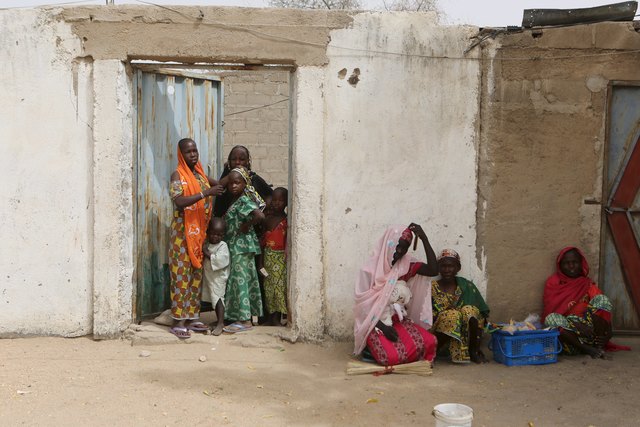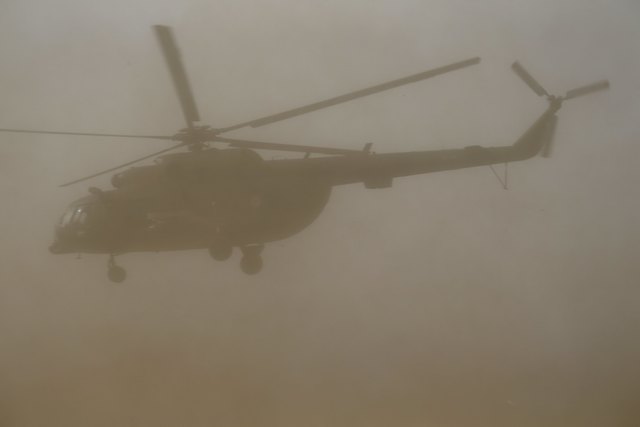Weakened Boko Haram sends girl bombers against Cameroon civilians


A Cameroonian military helicopter takes off in Kolofata, Cameroon.
(Photos: Reuters)
KERAWA, Cameroon – Adama Simila wears a knife tied to his belt by a piece of rope, his only protection against Boko Haram, the Nigerian Islamist insurgents who have repeatedly targeted his home town in remote northern Cameroon.
While the threat once came from heavily armed, battle-hardened jihadists crossing from neighbouring Nigeria, today Simila knows he is more likely to die at the hands of a teenage girl strapped with explosives.
“We’re here to look out for suicide bombers,” said the 31-year-old, a member of a local civilian defence force in the town of Kerawa.
After watching its influence spread during a six-year campaign that has killed around 15,000 people according to the United States military, Nigeria has now united with its neighbours to stamp out Boko Haram.
A regional offensive last year drove the insurgents from most of their traditional strongholds, denying them their dream of an Islamic emirate in northeastern Nigeria. An 8,700-strong regional force of troops from Benin, Cameroon, Chad, Niger, and Nigeria is seeking to finish the job.
Now, increasingly on the back foot, Boko Haram is retaliating with a deadly guerrilla campaign against civilians, and ordinary people like Simila have become the last line of defence.
“I’m not scared. They are people, we are also people. We must die to live,” said Simila, who was at the Kerawa market in September when two girls detonated themselves, killing 19 people and injuring 143 others. A nearly identical bombing at the same market followed in January.
Outside Nigeria, Cameroon has been hardest hit by Boko Haram, which now operates out of bases in the Mandara Mountains, Sambisa Forest and Lake Chad — areas straddling the borders between Cameroon, Nigeria, Chad and Niger.
Since August 2014, the sect has carried out 336 attacks in Cameroon, according to the Cameroonian army, which has lost 57 of its own men while defending the north.
Of 34 recorded suicide bombings killing 174 people, 80 percent were carried out by girls and young women aged 14 to 24 years.
Girls abused as sex slaves by the group are psychologically damaged and therefore more vulnerable, the army says. Boko Haram also uses girls because they are thought less likely to arouse suspicion, although that may be changing now.
“The goal now is to stop Boko Haram incursions into villages, stop them from planting IEDs (home-made bombs), and stop suicide bombings,” said Lieutenant-Colonel Felix Tetcha, a senior officer in the army’s operation against Boko Haram.
Cameroon has thrown vast resources into protecting the north.
In total nearly 10,000 of its troops are deployed against Boko Haram. The army’s Rapid Intervention Brigade (BIR), comprised of its most professional, best equipped soldiers, patrols a high-risk 400-kilometre stretch of the border with Nigeria.
The US military backs them with equipment, training and intelligence gathered from American drones flown out of a base in the town of Garoua. A Reuters reporter saw a small American military camp inside another BIR base in nearby Maroua.
Still, the terrain is mountainous and Boko Haram has rigged many roads with explosives designed to kill soldiers. Army officers are convinced that some fighters from Boko Haram, which pledged allegiance to Islamic State last year, have been trained at IS camps in Libya.
Armed incursions by Boko Haram fighters have dropped. But the army does not have enough soldiers to deploy in every town in northern Cameroon, and suicide bombers strike regularly, often several times in a single week.
“The border is under control, but it’s still very porous,” said Lieutenant-Colonel Emile Nlaté Ebalé, head of operations and logistics for the BIR’s mission in the north.
– Reuters



